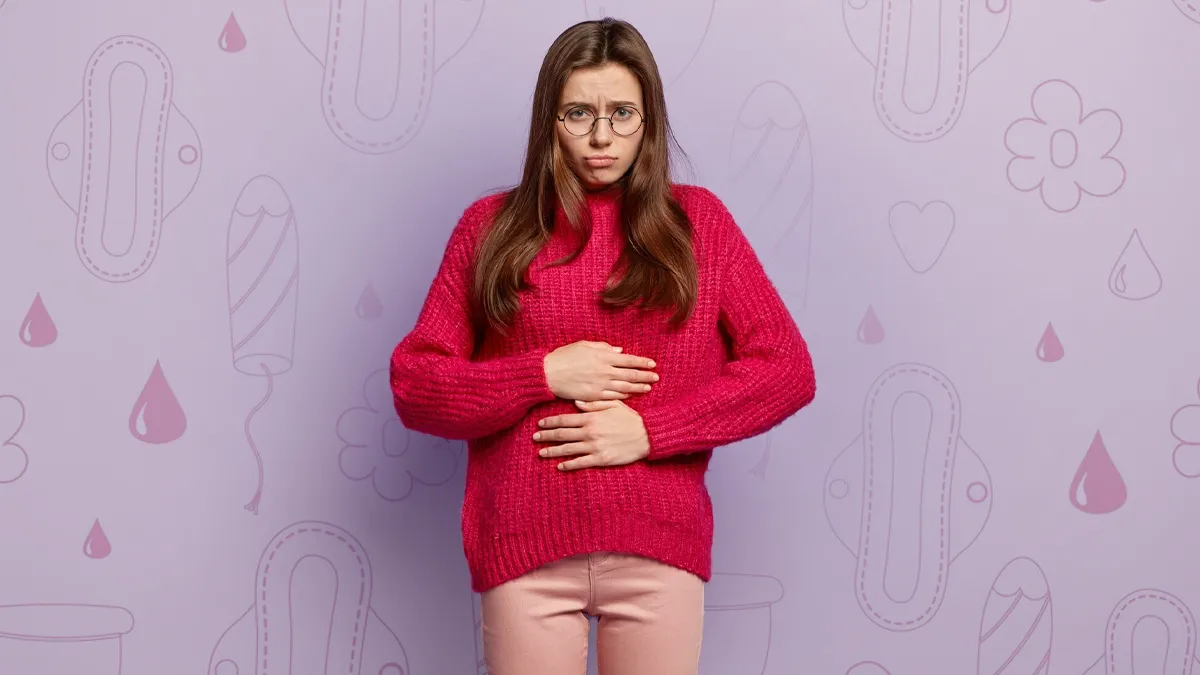
If you feel bloated before and during your periods, you are not alone. Bloating is one of the most common premenstrual and menstrual symptoms that many women experience. It usually begins a few days before menstruation and may continue for the first couple of days of the period. But have you ever wondered the reason behind period bloating? Are you looking for tips to prevent bloating during periods? Then you are at the right place.
Table of Content:-
In an exclusive conversation with the editorial team of Only My Health, Dr Chetna Jain, Director, Dept of Obstetrics & Gynecology, Cloudnine Group of hospitals, Gurgaon, gave us an insight into period bloating, its causes and much more. Read ahead.
Why Women Bloat During Periods
Dr Jain shares that period bloating is mainly caused by hormonal changes, especially fluctuations in estrogen and progesterone before menstruation.
“These hormones influence how the body regulates fluids and digestion. Estrogen promotes water and salt retention, while progesterone slows digestion, causing constipation and gas buildup. Additionally, during the luteal phase (the time between ovulation and the start of the period), the body’s insulin sensitivity decreases, making women crave more carbohydrates. Eating more carbs can further increase water retention, as glycogen (stored carbohydrate) binds to water molecules. All these hormonal and dietary changes together cause that uncomfortable swollen belly, which is a hallmark of period bloating,” explains Dr Jain.
She further adds, “Lifestyle factors — like consuming too much salt, lack of exercise, dehydration, and excessive caffeine or alcohol — can make bloating worse. Some women are also more sensitive to hormonal changes, making them more prone to bloating every cycle.”
Foods Groups To Reduce Period Bloating
Your diet plays a big role in how your body handles hormonal fluctuations during menstruation. Some foods can ease bloating, while others can make it worse. Dr Jain shares foods you should include in your period diet to keep bloating at bay:
- Fruits and vegetables: Water-rich fruits like watermelon, cucumber, and oranges help flush out excess fluids. Bananas are rich in potassium and help counteract sodium-related water retention.
- Whole grains: Brown rice, quinoa, and oats improve digestion and prevent constipation.
- Probiotic foods: Yogurt, kefir, and fermented foods such as kimchi or sauerkraut promote gut health and reduce gas.
- Leafy greens: Spinach, kale, and broccoli provide magnesium and calcium, which help balance hormones and reduce bloating.
- Lean proteins: Fish, tofu, lentils, and eggs help stabilize blood sugar levels and reduce cravings for salty snacks.
- Herbal teas: Peppermint, ginger, and chamomile teas are known to relax the digestive tract, reduce gas, and relieve water retention.
“Avoid carbonated drinks, fried foods, and artificial sweeteners, as they can worsen bloating by increasing gas or water retention,” warns Dr Jain.
Also Read: What Is Period Flu? Expert Explains Its Causes, Symptoms And More
Tips to Manage Period Bloating
Managing period bloating involves a combination of lifestyle changes, dietary modifications, and self-care practices. Our expert shares some effective ways to reduce discomfort:
- Stay hydrated: Drinking plenty of water may sound counterintuitive, but it helps flush out excess sodium and reduces water retention. Aim for at least 2–2.5 liters per day.
- Limit salt intake: Avoid high-sodium foods like chips, processed meats, pickles, and canned soups. Salt makes your body hold onto water, worsening bloating.
- Exercise regularly: Light physical activity such as walking, yoga, or stretching increases circulation, aids digestion, and helps release endorphins that counter menstrual discomfort.
- Reduce caffeine and alcohol: Both caffeine and alcohol can dehydrate the body and contribute to bloating or water retention.
- Get enough sleep: Poor sleep increases cortisol levels, which can upset hormonal balance and make bloating worse.
- Apply heat: A warm compress or hot water bag placed on your abdomen can ease cramps and reduce bloating.
- Wear comfortable clothing: Tight clothes around the waist can add to the pressure and discomfort caused by bloating.
- Take magnesium and vitamin B6-rich foods: These nutrients help reduce water retention and PMS symptoms.
When to See a Doctor?
Dr Jain warns that while mild bloating is normal and temporary, you should consult a doctor if:
The bloating is severe or persistent and doesn’t improve after your period ends.
It is accompanied by severe abdominal pain, nausea, vomiting, or changes in bowel habits.
You experience rapid abdominal swelling or sudden weight gain.
Bloating is interfering with your daily life or causing emotional distress.
“In some cases, severe bloating could be a symptom of underlying conditions such as endometriosis, irritable bowel syndrome (IBS), polycystic ovarian syndrome (PCOS), or ovarian cysts. A gynecologist may recommend hormonal evaluation, ultrasound, or dietary interventions depending on the cause,” concludes Dr Jain.
The Final Verdict
Period bloating is a natural but uncomfortable part of menstruation, caused by hormonal changes, fluid retention, and digestive slowdown. However, with the right diet, hydration, gentle exercise, and lifestyle habits, it can be managed effectively. If symptoms persist or worsen, medical advice is essential to rule out other health conditions.
Also watch this video
How we keep this article up to date:
We work with experts and keep a close eye on the latest in health and wellness. Whenever there is a new research or helpful information, we update our articles with accurate and useful advice.
Current Version
Nov 01, 2025 16:58 IST
Modified By : Chanchal SengarNov 01, 2025 16:58 IST
Published By : Vani Malik